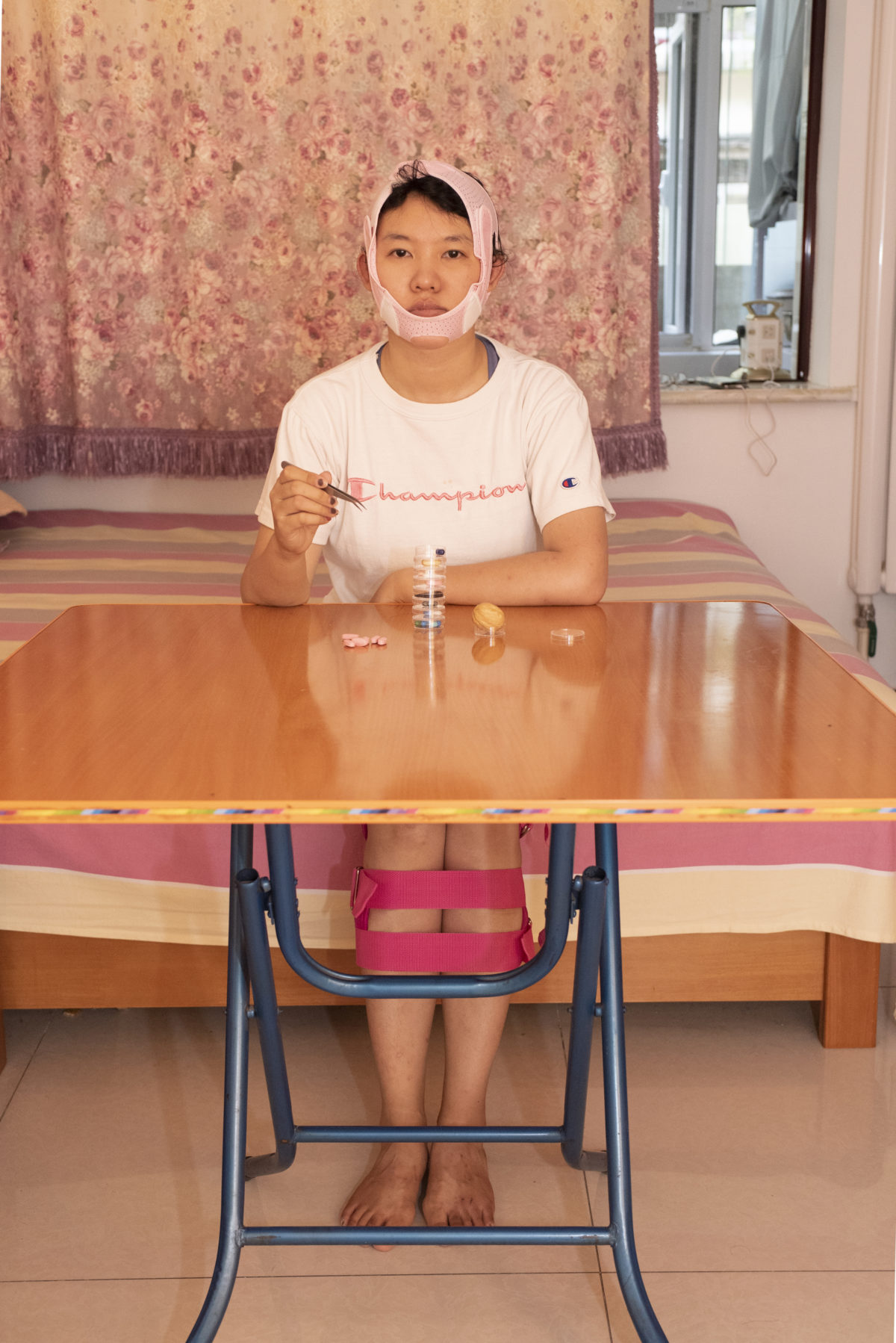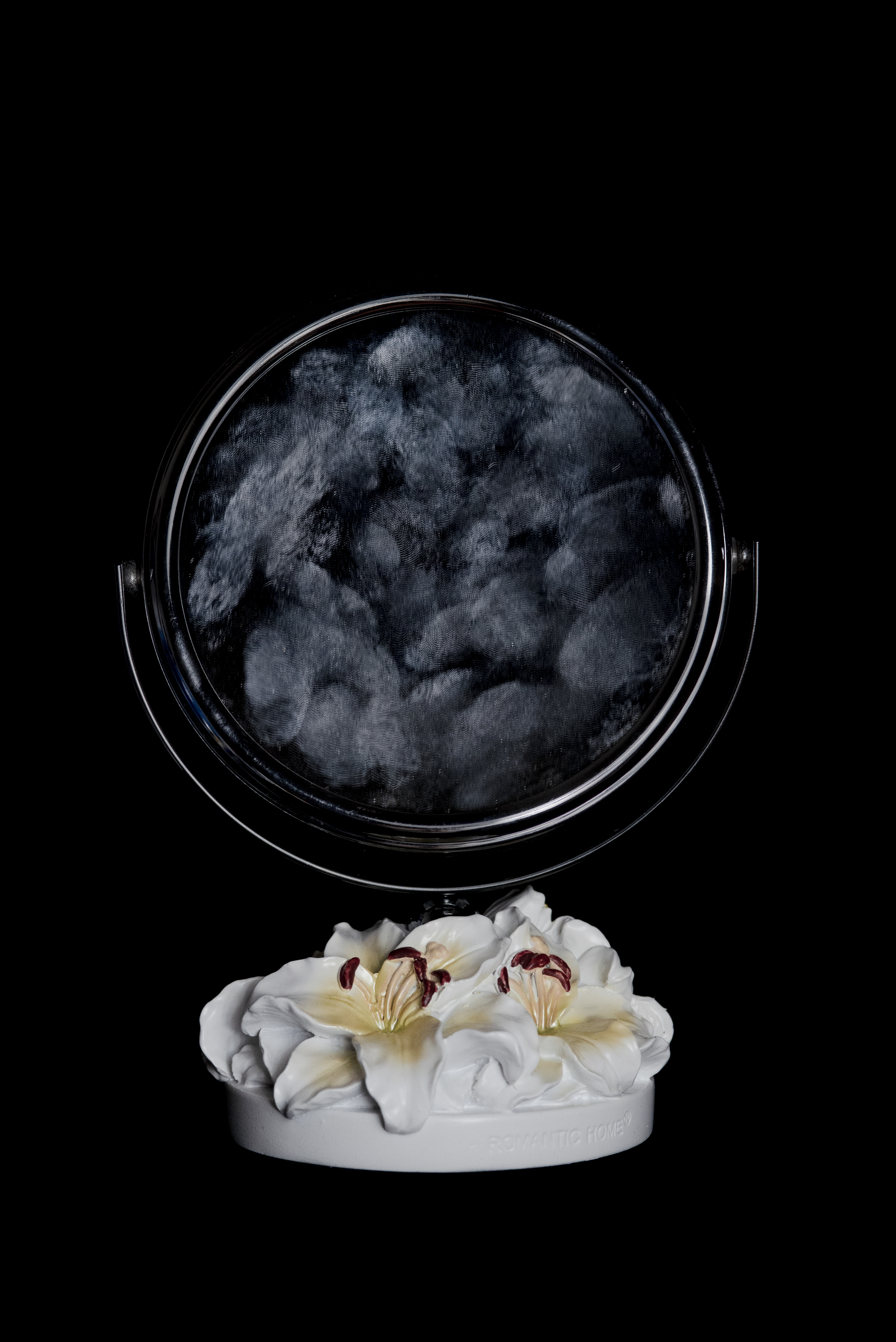From issue: #10 Care
The last time my bare face was able to make it past the front door without it being a breach of national security was Monday, 13 April 2020. The next day, the Singaporean government announced that mask-wearing would be made mandatory for anyone venturing outside their homes. As the rest of the world slowly followed suit (some requiring more convincing than should have been necessary), the mask became a totem of the times – a three-ply symbol of science, solidarity and, above all else, protection of the self and others.

Mask-wearing has also supposedly allowed us to start caring a little less about how we look. The quotidian problems of spots and ingrown hairs suddenly seem quite navigable in the light of civilisation’s imminent collapse – never mind that we have no one to see and nowhere to go anyway. Yet in the near-two hundred days since lockdown first began, I have somehow accumulated more beauty products than I’ve ever had in my entire life. Whenever trips to the supermarket left me in paroxysms of anxiety, I would retreat to the safety of my virtual shopping cart, browse discounted sun creams and balms, and try to remember how it felt to shop without the fear of infection pounding in my ribcage. I took to reading about scalp scalers before bed instead of soaring case numbers on data trackers. Many days, the only human interaction I had outside my family was with the mailman, slipping orange bubble envelopes full of samples under the gate, their labels bearing foreign addresses I could no longer visit. I felt like Nero, sheet-masking while Rome burned
When ‘self-care’ permeated mainstream culture in the aftermath of the 2016 US elections, it marked a resurgence of the movement, rather than an emergence – one that also coincided with the meteoric rise of the US$ 4.2 trillion wellness industry. Its roots can be traced back to as early as classical Greek philosophy, but it was in the 1960s that self-care was radicalised and liberated to the masses, most notably by women and civil rights groups like the Black Panthers. Although the same quote can now be found on iPhone cases, bedding and t-shirts on Redbubble, Audre Lorde famously clarified that self-care ‘is not self-indulgence. It is self-preservation, and that is an act of political warfare’. In the midst of a global crisis that has all but confirmed the catastrophic consequences of pursuing hypercapitalist models of labour, governance and healthcare, where does self-care sit within a society that increasingly demands both our continued participation in unsustainable systems – as well as a rejection of their rules?

Courtesy of the artist and Cooper Cole, Toronto
As the year and this digital residency draws to a close, I return to the works of Lu Yufan (born 1991) and Sara Cwynar (born 1985) to reflect on how the consumption of beauty has been seen as detrimental, yet simultaneously central, to our spirit of survival – even before these end times. In Tracy (2017-2018), Cwynar positions her model against a traditional studio backdrop and behind sheets of clear glass, across which a telling cornucopia of things are spilled: jewellery boxes, perfume bottles, lingerie ads. ‘I was thinking about some shared fate of these representations of women and these objects, how they had both faded out of view or become devalued a bit by the time I found them,’ she told Aperture. Conspicuously present, yet always out of reach, Tracy is simultaneously an archetype of feminine beauty and a living, breathing presence in Cwynar’s life – her long-time friend and art director Tracy Ma. ‘Tracy poses with great irony as if she’s really aware how bodies like hers have been depicted historically and how modernist studio portraits would have always been of white women,’ Cwynar explained to Sleek. Both subject and objects are rendered equally in focus within each frame, suggesting to the viewer that Tracy’s position – even in the process of commodification – is one of resistance.
To explore the psychology behind China’s cosmetic surgery boom, Lu Yufan visited various clinics to receive consultations – or ‘diagnoses’ – on her facial features in Make Me Beautiful (2018–). She leaves as a work-in-progress, her insecurities scrutinised and then re-confirmed in a damning scripture of bright red ink. Similar diagnoses are superimposed over stock images of the most heavily-requested looks on the Chinese market, where customers can choose between the sleek austerity of ‘high-level style’ or a Facetuned ‘internet celebrity style’. Each face offered Lu a way to become the woman she had always wanted to be, like ‘choosing products on a shelf’. ‘I could sense my weakness in front of the overwhelming consumerist culture’, she has said.

While the project was initially self-punishing, the process was ultimately ‘therapeutic’ for Lu, who hopes that it changes public perceptions of people who undergo cosmetic surgery. For many young Chinese, surgery was less about self-worship than it was ‘the outcome of a social reality’, a practical way to compete in an increasingly inequitable society. Instead of photographing her subjects post-surgery, Lu created tender, symmetrical carvings out of existing ID images to highlight ‘the insecurity about appearance that stays the same after the surgeries’ as well as the necessity of the choice they felt they had to make in a system that continues to fail people who lack built-in socioeconomic advantages. ‘People with marginalized bodies are acutely aware of the consequences of not meeting the standards of physical beauty,’ writes journalist Sesali Bowen. ‘Black women’s bodies are constantly policed, targeted for violence, marked as deviant or excessive and mined for cultural appropriation. Fatphobia, transphobia and ableism are part of our daily realities, especially for women of color … [But] many of us have instead found ways to leverage those standards for our own survival and success.’ This, Lu opines, is a conscious act of self-empowerment that deserves to be seen as such, rather than through the stigma of shame or artifice. ‘I agree with the feminist critique on cosmetic surgery, as it caters to the disciplinary powers that turn women into docile bodies,’ she told Sixth Tone. ‘However, it can also be argued that each woman has the right to decide her appearance.’
Self-care as Lorde defined it is a private practice. But there is one unbending law that unites our solitary rituals: the reminder that we cannot exist alone. Self-care does not seek to escape or deny the existence of oppressive hierarchies and injustices under the spell of a scented candle – in fact, it actively acknowledges their history of doing disproportionate damage to those who lack the systemic support we might someday ourselves in a position to give. In a year as transformed by death as it has been by monumental community action – protests, watershed elections, mutual aid – self-care lets us conjure the totems we each need to survive long enough to begin caring for one another, too. This time, ‘How do I look?’ is no longer a question in search of validation. It is one of preservation – and preparation. For many of us, it is exactly what we need to hear in order to carry on.
Test: Marissa Chen, Photoworks 2020 writer in residence.
Learn more about Marissa Chen Learn more about Yufan Lu Read more Photography+ here

